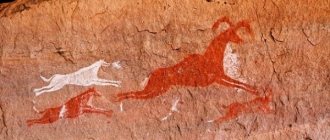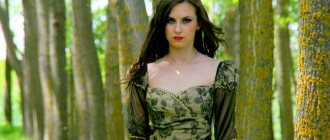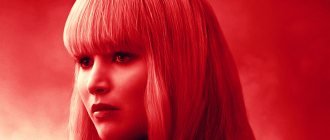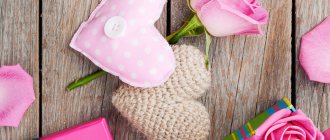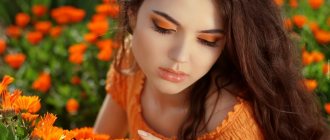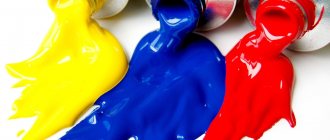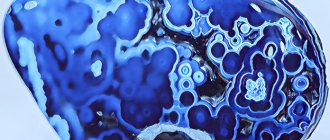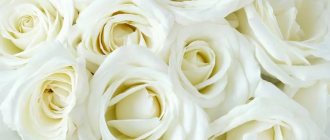The color red undoubtedly attracts the attention of society, as do all its shades. Most people associate it with passion, love, fire and blood. At the same time, the color red in psychology has special meanings that are diverse. For some, scarlet tones carry only positive characteristics, but others see them as a great danger. Let's look at the issue in more detail.
Symbolism of red
The symbolism of colors developed among peoples in ancient times and has survived to this day. The color red has received increased attention in all corners of the world, and many similarities can be found in the interpretations.
First of all, red color means the color of blood, life, flame. Moreover, in many languages, including Old Russian, “red” means “beautiful” - this is the meaning inherent in the phrases “red maiden”, “red sun” and in the name of the main square of the Russian capital. In Polynesian tribes, the words "red" and "beloved" are synonymous. The Chinese call sincere, open-hearted people “red heart”, as opposed to an insidious, dishonest person whose heart is black.
Red color and its shades
The color red has many shades, and each of them has its own personality. The skillful use of shades of red in clothing and everyday life helps to adjust the overall mood and well-being. It is important to know what properties these colors have in order to avoid negative influences and use positive qualities to your advantage.
Scarlet
A bright, pure shade of red is a symbol of life and warmth. Scarlet color is concentrated energy, activity, sensuality, emotionality. In folklore and literature, it is associated with the color of lips, flame, and blood. This color cannot go unnoticed, which is why it was chosen for both the outlandish overseas flower from a fairy tale and the sails of a dream come true.
Red lovers
A favorite color can tell a lot about character traits when drawing up a psychological portrait of a person. It is important to pay attention to the shades that a person prefers. The color red can express a wide range of feelings. Warm tones are romantic, passion and rebellion, cold and dark shades are maturity, authority, power.
Positive traits:
Willpower and self-confidence. Such people know how to overcome life's difficulties without losing their presence of mind. They are much better at this than others. Purposefulness, leadership. Fans of red color know how to achieve their goals and lead others. Energy, endurance. Bright shades of red are preferred by people full of vitality. They generously share their energy with others, charging them with vigor. Sexual activity. Lovers of red tend to desire an active and varied sex life. In extreme manifestations, this turns into promiscuity and promiscuity.
Reverse side of the coin:
Stubbornness.
The desire to achieve a goal often develops into a desire to insist on one’s own in any way. Intolerance to other people's points of view, unwillingness to compromise. Fans of red tend to defend their opinion even to the detriment of the result. Aggressiveness. The desire to insist on one’s own, regardless of means, leads to verbal, psychological, and physical violence. Cruelty. Red color is a symbol of authoritarianism and strength. People of a certain type realize their inclinations through cruel treatment of the weaker and dependent. Fans of red are avid debaters, and their confidence can easily develop into overconfidence. At the same time, these are charismatic leaders capable of implementing large-scale projects. Both men and women of this type are attractive to the opposite sex. Red color is chosen by sensual people.
Eight-color test
In modern psychology, the Luscher test is the classic and most frequently used psychodiagnostic technique, which, however, causes a huge amount of controversy among specialists all over the planet. The main idea of this system is the ranking of objects painted in different shades. The test subject’s task is to determine which ones he likes and which ones he dislikes. The validity is explained by the following hypothesis: if there are certain mental qualities, a person prefers certain colors; with other characteristics, he chooses other shades as his favorites.
Much research has been conducted to determine the relevance and wisdom of using the Luscher test. Scientists have found that there are many correlation coefficients between different positions. This can be regarded as confirmation of the existence of the phenomenon. Others, however, believe that such an abundance of coefficients indicates the inaccuracy and unreasonableness of the method.
Use in clothing
Red clothing is chosen by people who want to attract attention and who are not afraid of criticism and judgmental looks. In turn, red color adds self-confidence. This can be used in preparation for a crucial moment, if there is a need to overcome anxiety.
The color red in business clothing is used sparingly; we are mainly talking about accessories and discreet shades. Various tones of red are appropriate in outfits for informal settings, friendly parties, going to a restaurant or theater. Such clothing emphasizes sexuality, and we are talking about both women and men. A bright outfit is directly related to liberation, so when choosing clothes for a first date or an important event, you need to think about how appropriate such an image will be and which shade to choose.
Please note: an excess of red in the image can result in fatigue, irritability or aggression
Red clothing is a great choice for sports. It will add energy, determination, and desire to achieve results. The attention of others in the gym or while jogging on the street encourages you to give your best.
You should not use red-colored wardrobe items if you experience a loss of strength, depression, or high blood pressure. The color red can aggravate stress and prevents you from developing a trusting attitude when communicating with others. The exception is delicate shades of pink, which improve mood and give optimism.
Many or few?
According to psychology experts, the importance of the color red for a person cannot be underestimated. It has long been known that its lack in human appearance is an indicator of disease. Traditionally, this is a symbol of health, for example, a bright blush. Some believe that a lack of red can cause human illness. If there is too little of this color in the environment, headaches develop and nervous disorders may occur. Psychologists advise resorting to red in winter, because it’s easier to stay warm. Color, as some say, preserves heat longer. This color suits winter wardrobe items perfectly - frosts will not bother the owner of such items.
Red color in the interior
Red is a warm color with powerful energy. It is used quite limitedly in the interior, as it has an exciting effect on the psyche. In addition, dark and bright colors visually make the room smaller. The wrong choice of shade can make the interior difficult to perceive and oppressive.
In interior design, each shade of red has a specific area of application:
Rich red Suitable for creating accents in interiors in loft, hi-tech, and minimalist styles. You can paint part of the wall or shelving in this color, use textiles and decorative elements.
Burgundy can become one of the main interior colors in combination with neutral colors - gray, white, beige. Suitable for decorating a living room or kitchen. Can be used in Baroque style, in interpretations of historical interiors.
Crimson Suitable for interiors in a classical or historical style, baroque. Combines with gilding, golden fringe and ornaments.
Red color attracts attention and therefore requires a neutral environment. When creating an interior using red, it is important to maintain color balance
Pink This is the color for decorating a nursery, can be used in the kitchen or bedroom in country or Provence style in combination with white, gray, light wood.
Scarlet, fiery red Bright colors are used to create color accents when creating interiors in a modern style. You can paint the inside of the shelves, use textile elements, lamps and other interior items in the bedroom or living room.
Red-brown, terracotta Ideal for loft style. This color can become the main color in the interior of a bedroom or living room.
Therapeutic effect
Color effects became a subject of study by psychologists in the 20th century and continue to this day. The clinical effect of color therapy has been confirmed by numerous clinical studies. The famous specialist in the field of psychotherapy B. Bazy conducted a series of experiments. He placed the subject in a room where all the walls were painted red. A group of observers noted how being in it affected somatic reactions. Most subjects showed various symptoms within 5–10 minutes:
- cardiopalmus;
- increased blood pressure;
- temperature increase.
Particularly susceptible people sweated more, felt restless, and felt relieved to leave the room. Scientists have also found that red promotes abundant saliva production and increased hunger. If you offer a person food at this moment, he will eat greedily and quickly, experiencing an irresistible craving for satiety. Knowing this effect, many restaurant owners use red as the main interior color.
Combination with other colors
When thinking through the design of a room or combining wardrobe items, it is necessary to take into account the compatibility of red with other colors - achromatic (neutral) and chromatic.
Achromatic colors include white and black. Scarlet with pure white is a bright and harmonious pair that can be used both in clothing and in the interior.
Red and black are the quintessence of luxury and sexuality. An excellent option for a stylish evening outfit, but for decorating a room it is too radical an option - it is better to replace black with gray in various shades. In clothing, gray also successfully balances the aggression of red.
The list of chromatic colors that red goes well with includes sand color and shades close to it. Some tones of red can be successfully combined with shades of green, blue, and pink that are suitable in temperature and saturation.
Where is it used?
The color red always attracts attention, no matter in what context it is used.
As a signal “attention!”, it is used in women's clothing specifically to attract the attention of men. It's hard to go unnoticed in red clothes - it's the strongest and most energetic color. Red evening dresses of various textures and styles are especially striking. Wear them to social events and cocktail attire to corporate parties.
At work, too much red can lead to a tense atmosphere. Too much of it is overwhelming and can be off-putting. Therefore, it is recommended to use fewer bright colors in clothing. For example, a coral or raspberry blouse will add shine to an elegant outfit, and a dark burgundy suit will emphasize the solidity of the outfit.
Red tones in lip makeup are common. Both bright and rich lipstick colors, such as scarlet, carrot and raspberry, and more subtle and subdued colors, such as pink and coral, can be seductive. Recently, eye makeup in shades of red has become fashionable, both for evening and daytime. This eye makeup is suitable for owners of green, brown and blue eyes, but it must be used very carefully and professionally, otherwise you can achieve the “sleepless night” effect.
A red manicure can emphasize femininity and sexuality. Modern designers offer a variety of images and shades. Matte, with patterns, with glitter on nails - will satisfy every taste and occasion. A manicure in red tones will highlight your traits such as strength, sensuality, self-confidence, and the ability to achieve your goals.
The dynamism of red attracts people who are active, purposeful and love to be the center of attention. This often determines their choice in favor of a red car. By the shade of the “iron friend” you can determine the level of eccentricity and possible aggressiveness of the owner. Contrary to popular belief that red cars are chosen by ladies, statistics show that they are more often chosen by men. It's no secret that ladies who choose red feel more confident, successful and attractive.
In the interior, red is more often used to decorate the bedroom to stimulate partners' interest in each other. In moderate doses, it is also appropriate in the dining room or kitchen due to its ability to increase appetite. By the way, this property is also used by restaurant owners, thus attracting guests.
The red color used in advertising seems to bring the advertised object closer, drawing attention to it. The charge of this color is intended for impulsive behavior without unnecessary thinking. It is used in an erotic context to appeal to a male audience. Excessive use of red in advertising can, on the contrary, cause irritation and rejection.
Boldly using the color red in your everyday life will give you courage and confidence, as well as inspire and stimulate your zest for life.
Health effects
Red color appeals to extroverts and depresses introverts. It is considered a source of vitality. It adds energy to healthy and active people, can ignite passion, and give joyful emotions. For people who are tired or in a depressed mood, the color red is annoying and can cause aggression.
Red color therapy is used to treat depressed mental states. It also helps increase brain activity. Oversaturation with red color has a negative effect on the psyche - a person becomes overexcited, mental disorders, if any, worsen.
Color therapy for the treatment of physiological ailments began to be used several centuries ago. Today, exposure to red color is used as part of an integrated approach to the treatment of certain types of inflammation, skin diseases, measles, chicken pox, and scarlet fever.
Worth knowing
The eight-color test has seven degrees of freedom. First, a person chooses seven colors, and the last place remains for the eighth. The seventh has only two possible positions, that is, such an element has less freedom than the one determined first in the ranking. Of course, there are a lot of layouts in total (more than forty thousand), but this does not mean that the system makes it possible to determine 40 thousand states of the subject being studied. The model simply does not have such a resource. In classical theory there are two correlated scenarios.
At the same time, it does not seem reasonable to deny the phenomenon. A correlation with various aspects of life activity was revealed, although the method does not allow the diagnosis of all parameters. In fact, three parameters of the subject’s mental state are tested. They are connected with all spheres of life. Spontaneity-field dependence, mood-frustration, rigidity-trance are studied.
